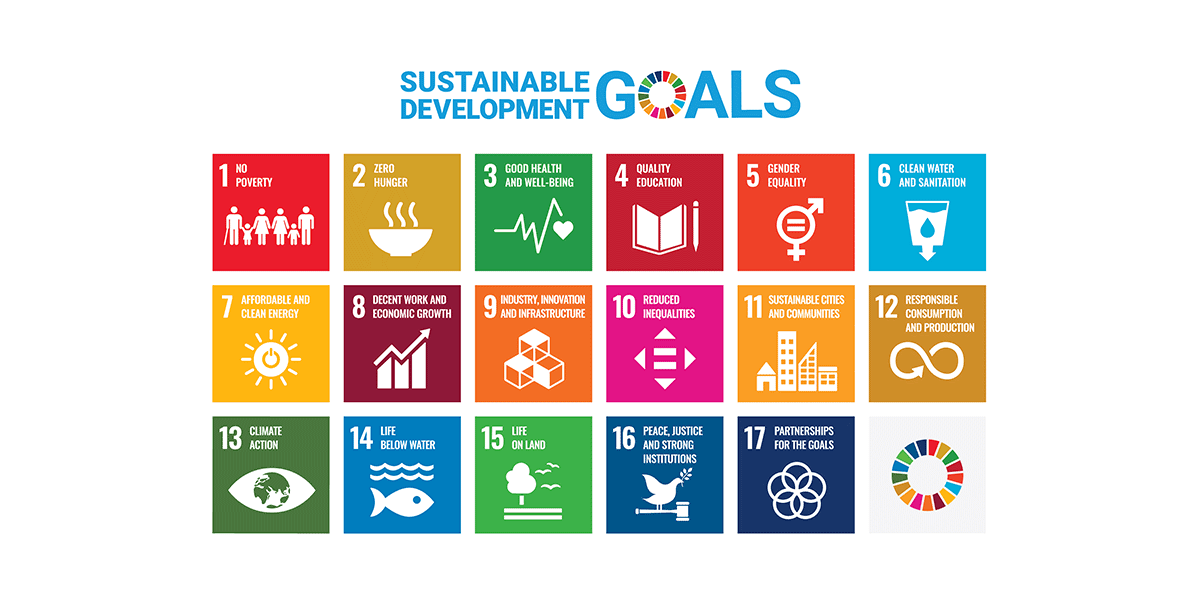SDGs×Murata
The importance of SDGs in business (Part 1)
1. What are SDGs?
In recent years, SDGs are often seen and heard in all forms of media. SDGs stands for "Sustainable Development Goals." SDGs were adopted at the 2015 UN Summit as international goals intended to make a better, more sustainable world. All 193 UN member states are participating, with the program consisting of 17 goals and 169 targets. Let us take a look at the 17 goals that are targeted for achievement by 2030.
- No poverty
- Zero hunger
- Good health and well-being
- Quality education
- Gender equality
- Clean water and sanitation
- Affordable and clean energy
- Decent work and economic growth
- Industry, innovation and infrastructure
- Reduced inequalities
- Sustainable cities and communities
- Responsible consumption and production
- Climate action
- Life below water
- Life on land
- Peace, justice and strong institutions
- Partnerships for the goals
The background for these 17 goals comes from the various challenges the world faces, including depletion of resources, environmental pollution, and poverty. For example, the Japanese government has adopted the Green Society goal, along with introducing renewable energy, in response to international efforts to restrict CO2 emissions. SDGs are global principles for solving social issues and achieving a sustainable society and are important milestones in advancing the future of society and the economy.

2. Why are SDGs important to businesses?
Not only are SDGs being promoted by the Japanese government, but stakeholders such as corporations, administrations, and communities are also actively engaged in such efforts. Among these efforts, corporations cannot simply chase profits. Consideration of environmental issues, contribution to local communities, and solving issues such as working environments must be essential parts of the management policy. These efforts are called "ESG" (Environment, Social, Governance), and have begun to garner attention as investment standards for corporate investors. SDGs are a more concrete form of ESG in that they define and set goals.
There are various reasons why SDGs and ESG are essential to businesses. The first is being able to create new business relationships based on SDGs as guiding principles, and the ease of building lasting and trustworthy partnerships with companies because they share common goals in SDGs. Also, engaging in SDGs attracts personnel with strong concerns over our social and environmental issues, which has an added benefit to companies in that job separation rates are lowered while also improving productivity. Additionally, responding to social movements with policies and continuous improvement in these issues will lead to a positive impression among corporate investors, financial institutions, etc. In other words, for a wide range of reasons, SDGs are an important part of a business’ growth strategy.
On the other hand, having so many companies engaging in SDGs creates competition, introducing risk if they choose not to adopt SDGs. Some major platformers have set future goals to ensure that the entire supply chain, from beginning to end, are engaging in SDGs. Put another way, engaging in SDGs could be seen by many companies as a condition for doing business with them. You could say that all proprietors and employees must be aware of and engage in SDGs to fully take advantage of available opportunities. While maximizing its potential growth, the company is helping to exponentially increase the improvements in SDG areas.
- Continue reading: The importance of SDGs in business (Part 2)
Other Links
Related articles
- Scope 3 Category 4 Reduction Measures - Taking On the Challenge to Both Increase Environmental Value and Reduce Costs Through Logistics and Packaging
- The GHG Protocol: Scope 1, 2, and 3 GHG Emission Reductions Companies Must Reach to Achieve Carbon Neutrality
- Murata Promotes Climate Change Measures – Kanazu Murata Manufacturing, The Road to a 100% Renewable Energy Plant (Part 2) –

